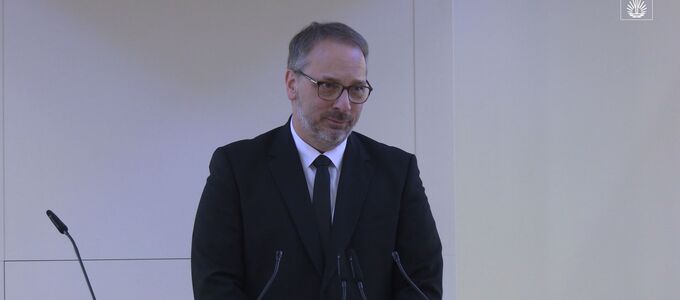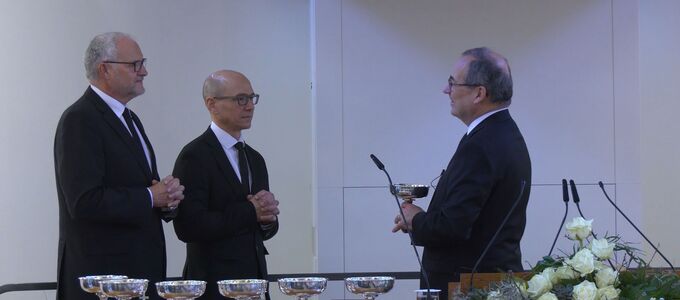
In choosing the motto for the year, Chief Apostle Schneider underlined the importance of personal prayer. In his first sermon of the new year, he addressed the different elements of prayer.
On 7 January, Chief Apostle Schneider celebrated the first divine service of 2024 with the congregation in Basle, Switzerland. To underline the annual motto “Prayer works!” he ministered to the congregation with the Bible text from 1 Thessalonians 5: 17: “Pray without ceasing,” like all the ministers worldwide did.
Significance of the Trinity
First, Chief Apostle Schneider referred to the image used by Paul, who depicts Jesus as an intercessor: “No matter what happens, Jesus Christ is at the throne of God and intercedes for us.” How does this image fit in with the New Apostolic understanding of the Trinity? “Do we think that the Father changes His will and His purpose because the Son prays for us. It does not work that way. They are one, they have one will.” Chief Apostle Schneider went on to explain that when Paul says that Jesus Christ intercedes for us, it means that God will always be ready to help you and forgive you. Paul points out that the Holy Spirit prays and intercedes for us when words fail us. “God will always hear the cry, the longing of our soul. He will always sense our pain, our suffering. He hears our prayer even if we cannot find the words, even if it is just a sigh.”
The Chief Apostle went on to explain the individual elements of prayer.
Adoration
To worship God properly, one should constantly reflect on the significance of His omnipotence and perfection: “He never makes mistakes. Everything He does is perfect. Nothing needs to be fixed or improved on.” God’s nature is love. This is also an aspect that we need to think about when we worship God. And such a prayer works, the Chief Apostle said: “It gives rise to the fear of God and to reverence, but also deep trust.”
Gratitude
Our own gratitude does not depend on our life situation, but is based on our heart’s attitude: “There are people who have a lot and are constantly dissatisfied. I see quite a bit of the world and I see people who have nothing and are very happy. The bottom line is that contentment and discontentment have nothing to do with what we have or don’t have.”
The awareness that the almighty God cares for you and the realisation of what you have already received from Him makes you grateful and content. “A grateful person is strong and is emotionally balanced. Gratitude becomes a blessing for us.”
Petition
The Chief Apostle appealed to the congregation to enter into dialogue with God and tell Him about all their concerns: “…without shame, without fear, without shyness, completely free about everything that worries you. Tell Him if you are happy. And if you are not happy, if you are angry, if you are annoyed, if you are dissatisfied, just come to God.” Prayer does not require a specific posture: “You don’t have to kneel to pray or kneel in front of your bed or in front of the altar. You can also have a conversation with God in your thoughts.”
Intercession
The element of intercession is an important part of our preparation for the return of Jesus Christ, the Chief Apostle said. “Jesus will take those to Himself who follow Him and do His will. And His will is that we love our neighbour as we love ourselves. This commandment alone gives rise to the need for intercession.”
Even so, intercession will not make God change His mind or His plan: “If that were the case, it would mean that we love our neighbour more than God loves him or her.”
The Scriptures testify to the importance of intercession, the Chief Apostle said. Jesus prayed for His own, the first Christians prayed for each other, and so did the first Apostles. Paul often appealed to the churches to pray for him.
Intercession first has an effect on the person praying: “Out of love for our neighbour we feel a need to pray for him or her. We make time and take an interest in their welfare.” It becomes clear: “God’s plan of salvation is the only solution, the only way for people to enter into a new creation and live together with God again forever.” The consequence from this insight is, in turn, intercession that focuses on the salvation of our neighbour.
And such intercession then also has an effect on our neighbour: “It is comforting for those who know that someone is praying for them. They can feel: there is still someone who is interested in me.” Chief Apostle Schneider himself testified to the effect of intercession: “I know that many brothers and sisters are praying for me. I don’t know who. I don’t know how many. But I know one thing: I feel carried by the prayers of my brothers and sisters. Intercession works!”
Your will be done
The Chief Apostle also picked up on an element of the Lord’s Prayer in his sermon. “Your will be done” is not a statement of resignation. “He does what He wants anyway. I can do nothing about it.” We can pray this line of the Lord’s Prayer with conviction and enthusiasm: “Dear God, Your will be done. I know what You want. You want to save me. You want to give me eternal happiness.”


























